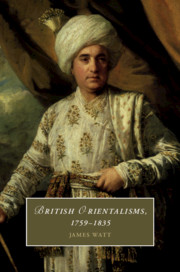Book contents
- British Orientalisms, 1759–1835
- Cambridge Studies in Romanticism
- British Orientalisms, 1759–1835
- Copyright page
- Contents
- Acknowledgements
- Introduction
- Chapter 1 ‘Those Islanders’
- Chapter 2 ‘Indian Details’
- Chapter 3 ‘All Asia Is Covered in Prisons’
- Chapter 4 ‘In Love with the Gopia’
- Chapter 5 ‘Imperial Dotage’ and Poetic Ornament in Romantic Orientalist Verse Narrative
- Chapter 6 Cockney Translation
- Chapter 7 ‘It Is Otherwise in Asia’
- Conclusion
- Bibliography
- Index
- Cambridge Studies in Romanticism
Chapter 5 - ‘Imperial Dotage’ and Poetic Ornament in Romantic Orientalist Verse Narrative
Published online by Cambridge University Press: 31 July 2019
- British Orientalisms, 1759–1835
- Cambridge Studies in Romanticism
- British Orientalisms, 1759–1835
- Copyright page
- Contents
- Acknowledgements
- Introduction
- Chapter 1 ‘Those Islanders’
- Chapter 2 ‘Indian Details’
- Chapter 3 ‘All Asia Is Covered in Prisons’
- Chapter 4 ‘In Love with the Gopia’
- Chapter 5 ‘Imperial Dotage’ and Poetic Ornament in Romantic Orientalist Verse Narrative
- Chapter 6 Cockney Translation
- Chapter 7 ‘It Is Otherwise in Asia’
- Conclusion
- Bibliography
- Index
- Cambridge Studies in Romanticism
Summary
In comparison with Sir William Jones’s work, much late eighteenth-century scholarly Orientalism was modest in its aims, mediating literary novelty as Jones had recommended in his 1772 ‘Essay on the Poetry of the Eastern Nations’. In his Persian Miscellanies (1795), William Ouseley, for example, undertook what he presented as the ‘humble’ task of removing the ‘thorns and brambles’ opposing readers’ passage to ‘the smiling garden of Persian Literature’, while in his collection of Romances (1799) Isaac D’Israeli included a version of the renowned story of Mejnoun and Leila, based on Ouseley’s translation. D’Israeli’s prose tale displays its roots in contemporary scholarship, but it also appeals to an older understanding of the East as a domain of romance rather than a sphere of political contention. D’Israeli indeed claimed that the tragedy of the couple surpassed any European analogue, since it concerned ‘two fervid Orientalists, capable of more passion, more grief, and more terror’, and in doing so he echoed William Collins’s earlier description of ‘Orientals’’ greater capacity for passionate feelings.
- Type
- Chapter
- Information
- British Orientalisms, 1759–1835 , pp. 157 - 191Publisher: Cambridge University PressPrint publication year: 2019



